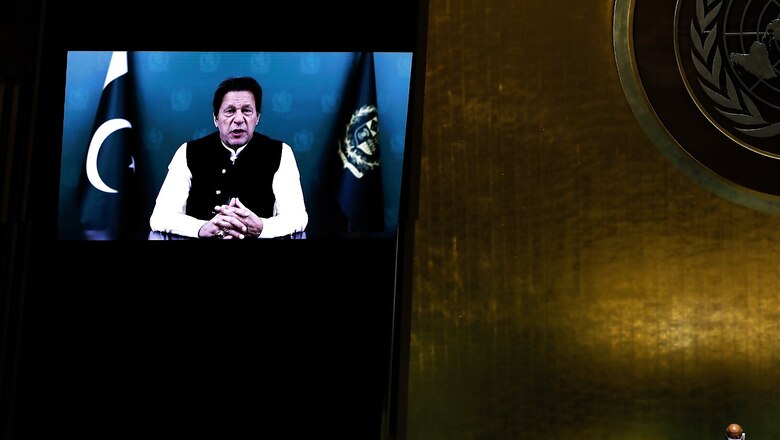
views
On February 9, 2022, there was a news report in the Daily Adalat wherein Raja Farooq Haider Khan, former prime minister of Pakistan-occupied Kashmir (PoK), stated that the United Nations resolutions on Kashmir are not binding on India and Pakistan. “The UN Resolutions do not force India and Pakistan to hold plebiscite in Kashmir. These have advisory status.” This is a rare moment when a mainstream political activist from Pakistan or PoK has publicly taken this position, which is significant.
The rhetoric from the political leadership of Pakistan about the UN resolutions has been a routine phenomenon. The establishment as well as political actors irrespective of the ideological divide have often repeated the mantra of UNSC resolutions to misguide gullible people into believing that this would be a panacea for the Kashmir issue and normalise relations between India and Pakistan forever. Take for instance Imran Khan’s United Nations General Assembly Speech on September 24, 2021, wherein he accused India of violating UNSC resolutions on Kashmir. “Indian actions violate the resolutions of the United Nations Security Council on Jammu and Kashmir. The resolutions clearly prescribe that the final disposition of the disputed territory should be decided by its people through a free and impartial plebiscite held under the UN auspices,” he said. What he left unsaid is more important. Let us analyse it objectively.
First, the UN resolutions on Kashmir, as Khan rightly referred to in passing, are prescriptive in nature. These are not enforceable since these were adopted under Chapter-VI of the UN charter rather than Chapter-VII (Chapter-VI calls for dispute settlement by peaceful means, whereas Chapter-VII enables the Security Council with punitive powers to enforce resolutions). Second, what the Pakistani leadership and its institutional spokespersons repeatedly peddle since 1947 are, unfortunately, half-truths.
Through a deliberate obfuscation and distortion of facts, a concerted campaign has been launched to rouse people’s emotions in Pakistan on Kashmir and win over, albeit unsuccessfully, a section of the Kashmiris. It is significant to bring the contents and conditionalities of the resolutions into the public domain for an objective analysis.
Of around a dozen redundant UN resolutions on the India-Pakistan question over Jammu and Kashmir, one of the most cited and overused by the Pakistani establishment is the 47th UNSC Resolution of April 21, 1948. The resolution recommended India and Pakistan to take measures towards creating “proper conditions for a free and impartial plebiscite” to decide the fate of accession of the former princely state. However, the selective amnesia of the Pakistani power elite comprising both military and political leadership never allows them to go beyond this sentence in the fourth paragraph of the resolution. What is overlooked and kept out of the public discourse are the measures that the state of Pakistan, in particular, was tasked to undertake towards creating feasible conditions vide Clause A 1 (a) enabling the UN Commission on India and Pakistan (UNCIP) to hold a plebiscite. To cite the exact expression used:
A. Restoration of peace and order
1. The Government of Pakistan should undertake to use its best endeavours:
(a) To secure the withdrawal from the State of Jammu and Kashmir of tribesmen and Pakistani nationals not normally resident therein who have entered the State for the purpose of fighting, and to prevent any intrusion into the State of such elements and any furnishing of material aid to those fighting in the State;
The UNSC asked Pakistan to withdraw all the tribesmen and Pakistani nationals who had entered the State for the purpose of fighting, and to ensure that (a) it did not undertake any further aggression and intrusion into the State, and (b) it should not supply any material aid to those fighting in the State. The second part of it is very important, given Pakistan’s open admission that it would continue to provide moral, political and diplomatic support to the ongoing so-called liberation movement in Kashmir, while it is actually training and equipping militants and facilitating their infiltration into Kashmir.
The onus, therefore, was on Pakistan to fulfil the conditions for any resolution to take effect, which it never intended to do, given the manner in which it domesticated the issue at the internal level. If one may argue, Pakistan, through its flagrant support to groups like Lashkar-e-Taiba and Jaish-e-Mohammad to run its proxy war to bleed Kashmiris and India internally, has violated the spirit of the 47th UNSC Resolution that it keeps harping on year after year. To put some sanctity into their shallow statements, as the country unsuccessfully tries to woo the Kashmiris, it would better behove the Pakistani establishment to first stop its support to the terror groups, which have been unleashing indiscriminate violence on the innocent Kashmiris for decades.
Further, Pakistan seems to forget multiple bilateral treaties it has signed with India over the years. In the aftermath of its humiliating defeat in 1971, with a part of its territory axed (Bangladesh) and 90,000 of its troops taken as Prisoners of War (POWs), Pakistan’s then president Zulfikar Ali Bhutto signed a “comprehensive blueprint for good neighbourly relations” with India on July 2, 1972 to “put an end to the conflict and confrontation”. The resultant Simla Agreement clearly mentioned that the two countries “resolved to settle their differences by peaceful means through bilateral negotiations or by any other peaceful means mutually agreed upon between them”. Here, Pakistan explicitly agreed to resolve all the outstanding issues with India through the bilateral mechanism, and hence seeking any UN role in any matter whatsoever defies rationality and goes against the grain of the bilateral spirit. India has rightly looked away from the UN resolutions ever since.
Two Countries, Different Paths
The two countries had rightly taken into consideration the changes that had taken place on the ground, over the next almost two and half decades, since the UN resolutions were adopted. India had taken care to ascertain the will of the people living within the part of Jammu and Kashmir under its control and the elections for the Constituent Assembly of J&K took place in September-October 1951. After three years of deliberations, on February 15, 1954, the Assembly unanimously ratified the state’s accession to India.
On the other side, Pakistan undertook a slew of measures to change the ground reality in the part of Jammu and Kashmir it occupied illegally. It divided PoK into two parts, forcing the anti-Maharaja leadership of the PoK to give up their claims on Gilgit-Baltistan vide the Karachi agreement of April 28, 1949, just months ahead of the agreement in Karachi between India and Pakistan on July 27, 1949 to establish a ceasefire line. Pakistan assumed exclusive power over Gilgit and Ladakh while the PoK leaders were to remain content with the rest of the territory that was called “Azad Jammu and Kashmir” (AJK).
The government of AJK has been under absolute control of the Pakistani state under the Ministry of Kashmir Affairs ever since and the harrowing tale of AJK leadership’s continuing struggle for autonomy is well-known. It is also true that Pakistan has orchestrated large-scale demographic changes in the entire terrain in violation of its purported commitment to UN resolution. In these changed circumstances, Pakistan’s demand to resolve the Kashmir issue through UN resolutions appears hollow and impractical.
People of Pakistan Must Question Establishment
To conclude, even if we take Imran Khan’s rantings and Pakistan’s regurgitations about the UNSC resolutions on Jammu and Kashmir seriously, it is the State of Pakistan that has created and continues to create obstacles in the way of any meaningful bilateral engagement to bring respite to the Kashmiris, for whom they are shedding crocodile tears. The Kashmiris have legally acceded to the State of India and continue to show faith in the country’s constitutional processes and the remedies available in the Constitution. It is Pakistan’s mindless obsession with Kashmir and its sponsorship of terror that tend to distract innocent Kashmiris and disrupt the otherwise peaceful environment in the state, resulting in perpetuation of a conflict situation that serves as an excuse for the Pakistani military to dominate the statecraft and befool its people into believing that they are doing it all for Pakistan’s survival and integrity as well as for securing the dignity and freedom of their brethren in Kashmir.
More than the rhetoric over these redundant resolutions, which Pakistan refused to comply with and act on in 1948, it is time for the Pakistani people to question their establishment over the falsification and obfuscation of the basic facts on Kashmir, which are crucial to understanding the agenda of the Pakistani elite to divert the attention of their people away from their failure to provide good governance towards an unwinnable war with India that they want to fight perennially, despite the fact that they have lost all the wars they have so far launched against India. The people of Pakistan, witness to the misadventures of their governments and army for decades, need to build pressure on the power elite (read the deep state) of Pakistan to create the right conditions for undertaking an honest conversation about Jammu and Kashmir with India (which has been under suspension since 2007-2008) to allow the people of Kashmir some respite from the cycles of violence, directly abetted by the agencies in Pakistan.
It is the obsession of the deep state to discuss only Kashmir with India and seek resolution through the UN resolution that has derailed the talks that were held under the framework of composite dialogue, ironically during the rule of a military dictator, General Musharraf. It is also interesting that Musharraf, the author of the Kargil war, had famously shown willingness to shed such obsession with UN resolutions and tread the path of composite dialogue that had yielded good dividends during 2004-2007. It is time Pakistan shuns the path of adventurism, stops misusing its resources to sponsor and train extremist groups, and returns to meaningful dialogue on Kashmir without harping on UN resolutions if it is really bothered about the dignity and lives of the people of Kashmir.
Shaikh Waleed is a Delhi-based Kashmiri analyst specialising in Pakistan affairs. The views expressed in this article are those of the author and do not represent the stand of this publication.
Read all the Latest Opinion News and Breaking News here


















Comments
0 comment